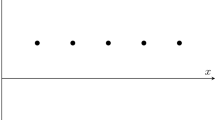Abstract
The so-called missing explanation argument, put forward by Mark Johnston in the late 80’s purported to show that our ordinary concepts of secondary qualities such as the colours cannot be response-dependent. A number of flaws were soon found in the argument. Partly in response to the criticism directed at the original argument, Johnston presented a new version in 1998. In this paper I show that the new version fails, too, for a simple reason: the kind of explanation which Johnston claims to be incompatible with a response-dependent account of the relevant concept is not an empirical explanation at all, but merely looks like one because of certain factors in Johnston’s stage- setting for the argument.
Similar content being viewed by others
References
Donnellan K.: 1979, ‘The Contingent A Priori and Rigid Designators’, in French, Uehling & Wettstein (eds.), Contemporary Perspectives in the Philosophy of Language (Midwest Studies in Philosophy II), pp. 45–60
J. Haukioja (2001) ArticleTitle‘The Modal Status of Basic Equations’ Philosophical Studies 104 115–122 Occurrence Handle10.1023/A:1010311311103
M. Johnston (1989) ArticleTitle‘Dispositional Theories of Value’ Proceedings of the Aristotelian Society Suppl. Vol. 63 139–174
M. Johnston (1993) ‘Objectivity Refigured: Pragmatism Without Verificationism’ Haldane Wright (Eds) Reality, Representation, and Projection Oxford University Press New York 85–130
M. Johnston (1998) ArticleTitle‘Are Manifest Qualities Response-Dependent?’ The Monist 81 3–43
S. Kripke (1980) Naming and Necessity Blackwell Oxford
P. Menzies P. Pettit (1993) ArticleTitle‘Found: The Missing Explanation’ Analysis 53 100–109
A. Miller (1995) ArticleTitle‘Objectivity Disfigured: Mark Johnston’s Missing-Explanation Argument’ Philosophy and Phenomenological Research 55 857–868 Occurrence Handle10.2307/2108336
A. Miller (1997) ArticleTitle‘More Responses to the Missing-Explanation Argument’ Philosophia 25 331–349 Occurrence Handle10.1007/BF02380038
A. Miller (2001) ArticleTitle‘The Missing-Explanation Argument Revisited’ Analysis 61 76–86 Occurrence Handle10.1111/1467-8284.00273
P. Pettit (1991) ArticleTitle‘Realism and Response-Dependence’ Mind 100 587–626
P. Pettit (2002) Rules, Rationality, and Civil Life: Selected Essays Oxford University Press Oxford
N. Salmon (1988) ArticleTitle‘How to Measure the Standard Metre’ Proceedings of the Aristotelian Society 88 193–217
S. Soames (2003) Philosophical Analysis in the Twentieth Century, Vol. 2: The Age of Meaning Princeton University Press Princeton
Author information
Authors and Affiliations
Corresponding author
Additional information
Manuscript submitted 25 October 2004
Rights and permissions
About this article
Cite this article
Haukioja, J. Why the New Missing Explanation Argument Fails, Too. Erkenntnis 64, 169–175 (2006). https://doi.org/10.1007/s10670-005-4309-1
Accepted:
Issue Date:
DOI: https://doi.org/10.1007/s10670-005-4309-1



